World-Renowned Pianist Has Special Place in His Heart for Quad City Symphony
Saturday in the Arts is a weekly feature covering a trend, subject, event or personality of local interest. It runs every Saturday morning on  your site for the best entertainment and arts coverage in the area, QuadCities.com!
your site for the best entertainment and arts coverage in the area, QuadCities.com!
I am listening to pianist Garrick Ohlsson’s magisterial, towering 2005 transversal of the immortal 24 Preludes by the iconic Romantic composer Frederic Chopin, and the masterful miniatures are unspooled with inspiring tenderness and care, thundering, breathtaking virtuosity, achingly beautiful lyricism, crystalline precision and profound emotion.
It’s no wonder that Ohlsson – an enormously gracious, friendly 73-year-old New York native – was the first (and remains only) American winner of the Chopin International Piano Competition, in 1970. He’s since established himself worldwide as a musician of mind-bending interpretive and technical prowess. Although long regarded as one of the world’s leading exponents of the music of Chopin, Ohlsson
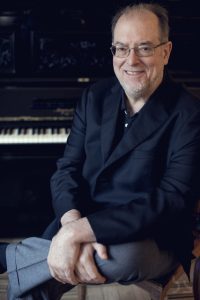
Ohlsson, 73, was the first and only American (so far) to win the Chopin International Piano Competition, in Warsaw, in 1970.
commands an enormous repertoire, which ranges across the entire piano literature.
A student of the late Claudio Arrau, Ohlsson has been applauded for his glittering performances of the works of Mozart, Beethoven and Schubert, as well as the Romantic repertoire. To date, he has at his command more than 80 concertos, ranging from Haydn and Mozart to works of the 21st century, many commissioned for him. One of his favorites – Samuel Barber’s powerful 1962 concerto – will be showcased Saturday night and Sunday afternoon with Ohlsson at the keyboard, and the Quad City Symphony Orchestra, under the direction of the equally passionate conductor Mark Russell Smith.
It’s part of the first Masterworks concert of the 2021-22 season, which is themed “From the New World,” which was intentional, Smith said. The beloved Antonin Dvorak “New World” Symphony is on this weekend’s program as well.
“We talked about what kind of statement we’d make when we comeback, and it’s a new world,” he said recently. “We’re hoping it’s a new post-Covid world. With the Delta variant, it hasn’t played out exactly like that. We’re trending that way and it’s a super strong statement to make. And we put Garrick Ohlsson on the opening concert, a powerhouse. He’s the huge star.”
The Barber concerto “is so great and so underappreciated,” the conductor said. “That’s from the new world too – it won the Pulitzer Prize, it’s a great American work that I think is underplayed.”
“Knowing how he plays this piece and knowing how the audience will react to this piece, even though they don’t know it,” Smith said of Ohlsson. “It’s an electric piece, like Rachmaninoff and Prokofiev, with Samuel Barber’s edge and kind of American spunk. It’s really virtuosic and thrilling, and he plays it so well. I wanted
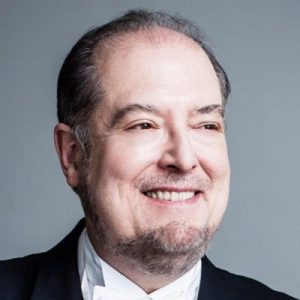
Garrick Ohlsson last performed in the Q-C in November 2016, in the Brahms Second Piano Concerto.
this piece, but I specifically wanted him and this piece together.”
In a recent Concert Conversations (over Zoom), with Smith and orchestra emcee Kai Swanson, Ohlsson said: “I think this is the great American piano concerto so far, very seriously.”
“Barber was wildly popular,” he said, noting he wrote the opera “Antony and Cleopatra” for the opening of the Metropolitan Opera in 1966. “When a composer is loved, and very melodious and successful, a lot of the fans want him to do the same thing again.”
When New York City’s Lincoln Center opened in 1962, it featured new works, with the Barber Piano Concerto among them. “The public wants to embrace the new music – but they really want to hear Beethoven and Tchaikovsky, let’s face it,” Ohlsson said. “So, to have a sensationally successful modern piano concerto was a great thing.”
If you’ve never heard the Barber, you could think of it in the Rachmaninoff/Prokofiev brilliant style, he said.
The piano writing is similar and looks fiendishly difficult to play, Smith said,
“It is, but then most of the pieces that I or other soloists play are fiendishly difficult,” Ohlsson agreed. “That’s why you get good people to do them, because they’re not stuff just anybody could play. It’s as challenging as a Rachmaninoff, Prokofiev or Tchaikovsky, in that virtuosic, heroic mold.”
It’s still not played that often and a big reason the QCSO is doing it is since Smith feels his job as music director is “to introduce you to a piece, we heard it in the ‘60s but it’s been a long time, and it’s a piece you should know and I know you’re gonna love. You know Garrick Ohlsson and you know me, and we’re advocates of this piece,” he said. “It’s a great piece, and there are so many underrepresented pieces like that, and this is right at the top of my list.”
The QCSO also is ending the new season with a major Barber, his 1st Symphony…”which has that incredible lyricism, but also that edgy drive,” Smith said. “It has that brash, American, ass-kicking rhythmic drive, which I think is American.”
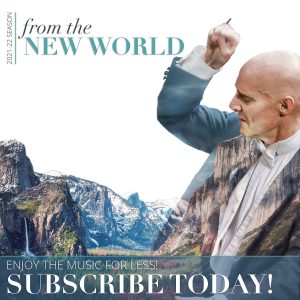
The QCSO’s new season is titled based off the opening program’s symphony, “From the New World.”
The Barber Piano Concerto came at a time when the U.S. was the economic champion of the world, power at its zenith after World War II. “Its confidence was just amazing,” Ohlsson said. “I think it has that brashness, and it’s so paradoxical as we speak about music in general – how is the music we think of Americana was invented by Jewish composers from Brooklyn? It just shows you that, as Walt Whitman said, everyone contains multitudes. Copland especially, channeling all things that were American.”
Smith tries to bring authenticity to each work – to play Dvorak like Czechs, Brahms like Germans and Barber like Americans.
“That’s the beauty of it – we have to be eclectic and know all these styles, because we came to the game so late,” he said of U.S. orchestras. “We embrace and we can be Spanish, whatever we need to be for that piece.”
Smith told Ohlsson how glad he is to have him back in the Q-C. “You’re beloved here; you are one of my favorite musicians in the world,” the conductor said. “I’ve heard you a lot in Minnesota, where I live. It’s so great for us to introduce our audience to this piece again, because it’s one of those. You’re the perfect messenger, in my opinion.”
From Ohlsson’s first visit to the QCSO, he said he recognized this as an ensemble of “extraordinary quality.” “Here I found an orchestra playing at a level higher than one might reasonably anticipate,” he said in the Concert Conversations. “I actually tell people all over the place about the Quad City Symphony, because it’s remarkable.”
Inspired by the Barber and Browning
A native of White Plains, N.Y., Ohlsson began his piano studies at the age of 8, at the Westchester Conservatory of Music; at 13 he entered the famed Juilliard School, in New York City. His musical development has been influenced in completely different ways by a succession of
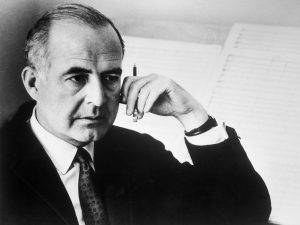
American composer Samuel Barber (1910-1981) helped open Philharmonic Hall at New York’s Lincoln Center (now David Geffen Hall) in September 1962 with his Piano Concerto.
distinguished teachers, most notably Claudio Arrau, Olga Barabini, Tom Lishman, Sascha Gorodnitzki, Rosina Lhévinne and Irma Wolpe.
Although he won First Prizes at the 1966 Busoni Competition in Italy and the 1968 Montréal Piano Competition, it was his 1970 triumph at the International Chopin Competition in Warsaw, Poland (Chopin’s homeland), where he won the Gold Medal (and remains the single American to have done so), that brought him worldwide recognition as one of the finest pianists of his generation.
Ohlsson did hear John Browning play the Barber Concerto in the ‘60s, when he was about 16, conducted by Leonard Bernstein at Lincoln Center, and the audience was enthralled.
“It was very exciting for a young artist to watch that. I remember thinking that, I want to play that piece one day,” he said in a recent phone interview.
Ohlsson played the Barber in the mid ‘80s under Smith’s baton in Springfield, Mass. (though he’s never made a recording of the work).
“I remember it very distinctly and he did a wonderful job,” he said of Smith. “And it’s a wonderful piece.” The only time the QCSO has performed it was with Browning in 2000.
“There are arguably a few novels that might be the Great American Novel. This is certainly the Great American Piano Concerto in one sense,
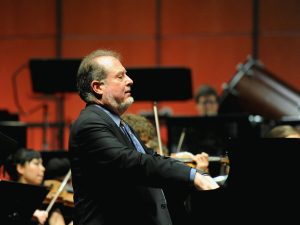
Ohlsson has roughly 80 piano concerti at his fingertips, including the 1962 Barber.
which is that this is a classic concerto with brilliant orchestration, in the mode of piano concertos as they evolved, through the 20th century,” Ohlsson said. “But not the kind of 12-tone or Schoenberg-esque. This is much more sort of Rachmaninoff, Prokofiev style, but with an American flavor and accents.
“It definitely sounds mid-20th century American, a little bit film noir in the first movement, but I think it’s a masterpiece,” he said. “It’s got what very few pieces have after World War II — which is several really beautiful melodies. “Barber was always a great melodist, and he, like Rachmaninoff, suffered from not being progressive enough for part of the musical establishment. And because Barber always had this blatantly melodic, romantic side to him, which he expresses. The first and last movements are a bit more modern-esque, but they’re nothing like the modern music being written in the ‘50s and ‘60s. He was considered by the progressives to be old-fashioned. But audiences always liked him. I don’t know why it’s fallen out of favor. I can’t imagine because it is as effective as any Prokofiev concerto, and nothing is as effective as the Rachmaninoff 2nd and 3rd, if the truth be told for the public.”
“I think it’s a terrific vehicle for the piano. In other words, it’s written for a heroic, virtuoso pianist and it’s got brilliant orchestration,” Ohlsson said. “It’s incredibly effective; the first movement is very dramatic, quite film noir, but it has that yearning, beautiful romantic melody right in the middle of it. And then the second movement is enchanting canzone, a song. And the last movement is just a barnburner of an exciting piece, in 5/8 time. So I personally don’t know why it’s not popular, more popular, but it’s certainly effective and I’ve never played it when the audience didn’t like it just as much as it liked any major piano concerto.”
First time with the QCSO in 1978
The first time he played with the QCSO was in 1978, and he’s been here about five times since, most recently in fall 2016 (in the Brahms Piano Concerto No. 2).
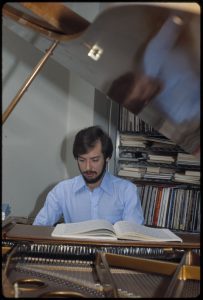
Ohlsson pictured in January 1978, just one month before his debut with the Quad City Symphony, playing Beethoven’s “Emperor” Piano Concerto.
“The first time I had played with the Quad City Symphony, I had been with all kinds of orchestras – some of the greatest in the world, and some of the least in the world, of course, because it’s a wide range. I didn’t know Quad-Cities, and nobody told me a thing about it,” Ohlsson recalled.
It was February, snowy and he wondered why he was here, meeting then-conductor James Dixon. They performed the regal Beethoven Piano Concerto No. 5 (“Emperor”).
“I thought, wow, beautiful playing, especially good tone, in tune, good intonation, good balancing, good listening habits. I thought this is much better than I expected from, how can I put it, the demographics of the Quad-Cities,” Ohlsson said. “I know you’re not small, but you don’t have a catchment area of just 10 million, like Chicago does, to draw from.”
“I was very impressed and I knew at that point too, when you have a regional orchestra playing perhaps well above the level you might expect, I knew that had a lot to do with the music director, too, because of the musical qualities the music director instills,” he said. “I learned that was true with Mr. Dixon and it’s true with Mark, too – to maintain that. It’s no easy job to maintain and improve any orchestra’s standard of playing.”
“It’s a constant, you work at it all the time,” Ohlsson said. “To make anything better in life, it takes a lot of
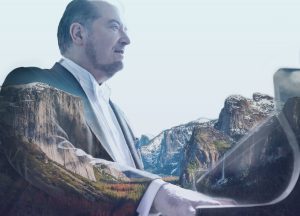
Ohlsson is taking on a new world with the new QCSO concerts this weekend.
effort and commitment, and it takes commitment on the part of the players in the orchestra, and those that put the orchestra in the community – administration, boards of directors, donors, all that stuff. It’s a huge effort.”
In 2018-19, he launched an ambitious project spread over multiple seasons, exploring the complete solo piano works of Brahms in four programs to be heard in New York, San Francisco, Montreal, Los Angeles, London and a number of cities across North America.
In February 2020, he accomplished a seven-city recital tour across Australia just prior to the closure of the concert world due to Covid-19. Since that time and as a faculty member of San Francisco Conservatory of Music, he has been able to contribute to keeping music alive for a number of organizations with live or recorded recital streams including a duo program with Kirill Gerstein with whom he will tour the U.S. in winter 2022.
With the re-opening of concert activity in the U.S. in summer 2021, he appeared with the Indianapolis and Cleveland orchestras, in recital in San Francisco, Brevard Festival in North Carolina, and four Brahms recitals at Chicago’s Ravinia Festival.
He played with an orchestra in Zurich, Switzerland in June 2021, but it was three concerts with just 100 people at each, due to Covid safety rules. His first live in-person concert back this year was with the Indianapolis Symphony in June, wearing a mask, with 25-percent capacity audience limit.
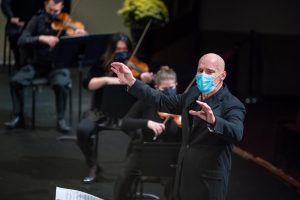
Mark Russell Smith conducted the orchestra in mask last season, which included some concerts in an empty hall, available for people to see online up to 30 days afterward.
From Ohlsson’s July 1, 2021 concert at Chicago’s Ravinia Festival, playing Brahms, veteran classical music critic John von Rhein’s review at chicagoclassicalreview.com said:
“One can think of few A-list virtuosos better equipped to vanquish not only the sometimes awkward technical difficulties of this music but also to lay bare its communicative possibilities. He understands that merely delivering a clean, efficient exposition of the notes Brahms put on the page is only half the battle, that the interpreter must search out the expressive meaning in and between the notes if this sometimes elusive music is to reveal its full essence. Above all, he never made piano writing that feels ungainly to the fingers sound ungainly to the ear.”
A pre-Covid review (of a November 2019 Beverly Hills concert), first wrote of Ohlsson’s Brahms:
“…giving us a crystalline Capriccio in D minor; a lovingly languid Intermezzo in A; alacrity for the Capriccio in G minor; a tender and amazingly sensitive Intermezzo in E major; and introspective for the E minor. During the final two, he elucidated that uncanny ability to keep the melody hurling between hands, almost as if a third hand was in play. Extraordinary.
“His feather-light dexterity made the Variations on a Theme of Paganini, Op. 35 (Book II) rather a revelation with its textual diversity, range of colors, and incredible power.
“But it was the Chopin in the second half that obliterated all which came before. Every Chopin admirer understands that there is an incredible elegance to all of Chopin’s music, but I think most certainly in the Nocturnes, that is indefinable — at once sensual and very spiritual. For the Nocturne No.1 In B Flat Minor, Op.9 No.1, he exuded a sense of great balance and at the same time a depth that is unique. And for the Sonata in B minor, Op. 58, there are certainly adjectives such as ‘sublime’ and ‘invigorating,’ but throughout, Mr. Ohlsson delivered the most refined, thoughtful and exquisite pianism imaginable; his beauty of tone production was often heartbreaking, sending us to places never visited before.”
How he coped during Covid
Like other musicians worldwide, Ohlsson’s touring career ground to a halt in March 2020, due to the Covid pandemic.
“After 50 years, you’re kind of addicted to the adrenaline rush, number one, which is not an unhealthy thing. It’s not a forbidden chemical.
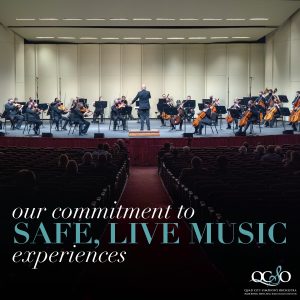
The QCSO’s return to full-capacity audiences include a fully vaccinated orchestra, staff and volunteers, and all patrons are required to wear masks during indoor concerts.
But also, in comparison with athletes, we do work and stay in shape, and practice and learn music,” he said.
Without the goal of public concerts to aim for, Ohlsson was disappointed, though he played solo music about once a month at great venues in San Francisco for livestreamed concerts. “It gave me a target toward playing my best at. Streaming is excellent and may be a new element of concert life, but it’s not gonna replace the real thing. There’s nothing like the synergy of performer and audience.”
“The audience stimulates us and we stimulate the audience. When it goes well, it’s very exciting. It’s like somebody wrote in an op-ed – when I go to the movies, I want other people to be there. I don’t actually want to talk to them, but I want to see the film with them. Same with theater and same with music. It’s social in an abstract way, but the fact that everyone’s there paying attention, and that creates its own energy, and that’s an incomparable thing which I very much love.”
During Covid, Ohlsson said it was nice to be home for 15 months for the first time in 50 years, and kept up his piano technique, learning new pieces. “I learned quite a lot of music during this whole time at home, but I learn quite a lot of music all the time,” he said. “So I’m not sure. I’m not sure I learned any more than I would normally.”
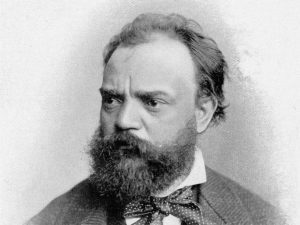
Bohemian composer Antonin Dvorak (1841-1904) wrote his Symphony No. 9 (“From the New World”) in America in 1893, including that summer he spent in Spillville, Iowa.
He’s not sure why there hasn’t been another American pianist win the prestigious Chopin competition, which is held every five years, and which Ohlsson helped judge in 2015.
“That is a good question. Americans have won piano competitions, but I suspect it’s in proportion to the number of Americans who study at leading conservatories around the world,” he said. Now, at Juilliard and Curtis – two of the finest music schools – over 75 percent of the piano students are Asian, with many having been born in America, Ohlsson said.
In 2015, a South Korean won the Chopin competition, with half the contestants from China, Japan and South Korea, he said.
“Are they the only ones to work that hard? Because to be a pianist is to work very hard,” Ohlsson said. “I don’t know the answers to these cultural shift questions.”
When you win the Chopin prize, it’s more than a piano competition, since Chopin (1810-1849) is the favorite son of the whole nation, he said.
Ohlsson has performed nearly a dozen tours of Poland, where he retains immense personal popularity. Ohlsson was awarded the Avery Fisher Prize in 1994 and received the 1998 University Musical Society Distinguished Artist Award in Ann Arbor, Mich. He is the 2014 recipient of the Jean Gimbel Lane Prize in Piano Performance from the Northwestern University Bienen School of Music, and in August 2018, the Polish Deputy Culture Minister awarded him with the Gloria Artis Gold Medal for cultural merit.
Of the Chopin international contest, he said: “If you win that competition and play music in his country, they take you to their hearts in an extravagant way.” When Ohlsson won the 2018 Gold Medal in Poland, “and I had no idea it was going to happen, I was very deeply touched,” he said.
He doesn’t tour much with the two Chopin piano concertos, which he said are beautiful pieces but far from his greatest work – written when he was 20. “They’re absolutely ravishing, but they’re not the works that will immortalize him,” Ohlsson said. “You can’t compare the two concertos to the third sonata as a musical composition.”
Also, the Chopin orchestra is basically just a “beautiful background for the soloist to dream on,” the pianist said. “It’s not as interactive as playing a Beethoven or Brahms or Barber concerto.”
An avid chamber musician, Ohlsson has collaborated with the Cleveland, Emerson, Tokyo and Takacs string quartets, including most recently Boston Chamber Players on tour in Europe. Together with violinist Jorja Fleezanis and cellist Michael Grebanier, he is a founding member of the San Francisco-based FOG Trio. Passionate about singing and singers, Ohlsson also has appeared in recital with such legendary artists as Magda Olivero, Jessye Norman, and Ewa Podleś.
QCSO thrilled to be back in full
Smith said he and the orchestra are pumped to finally return without audience capacity limits, and the first time the complete QCSO has played together in 18 months. “To have people clapping, and to turn around and not play in an empty hall, it’s very exciting,” he said.
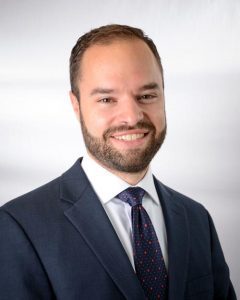
Brian Baxter is executive director of the Quad City Symphony Orchestra.
“Absolutely, with a potential full house and a lot more people, the energy is gonna be really great. It’s going to be an electric evening, I really think so. People who will be there will be thrilled, I’m pretty confident. That’s the question – when are people gonna feel comfortable coming out? It’s anybody’s guess. We’re hoping it’s sooner rather than later.”
For the first America-themed concert this weekend, they purposely wanted “to start with a big bang,” Smith said. “And with one of the greatest pianists on Earth.”
The first Masterworks concerts of the 107th season will be Saturday, Oct. 2 at 7:30 p.m. (at the Adler Theatre), and Sunday, Oct. 3 at 2 p.m. (at Centennial Hall, Augustana College). The program is comprised of Dudley Buck’s Festival Overture on the American National Air, Barber’s Piano Concerto, Op. 38, and Antonin Dvorak’s Symphony No. 9, Op. 95, “From the New World.” From the orchestra
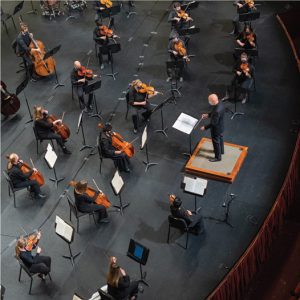
The QCSO featured reduced, socially distanced ensembles in the 2020-21 season.
point of view, Smith and the musicians still gave their all in concerts where there were no audiences at the 2,400-seat Adler Theatre in the past year.
“Without question, the energy was there,” he said. “When there’s no audience, you’re focusing on each other. You’re focusing on each other no matter what. But part of the reason was, this was one of the few orchestras that was actually playing.”
“So much of their work was gone, so this time we had together was very special,” Smith said of the QCSO freelance players. “It was even more special, because they were able to be the artists that they are, when they were denied that opportunity in so many other arenas. And it was a reminder about how valuable art is – if souls needed touching, last year was the year when souls needed touching, on so many levels.
“To be able to commune with others, to commune with great art, and to bring beauty into a world that was pretty damn ugly, I think it was very special,” he said. “It gave us energy and also emboldened us, really, to think about how important it is – what we do, and to recommit ourselves to that.” The online digital access also literally made the QCSO concerts more accessible to a much greater population (outside the Q-C) than who’d ever be able to attend the concerts. Smith said his twin sisters in San Francisco and Portland, Ore., and his nephews and nieces who never saw him conduct before, could watch online.
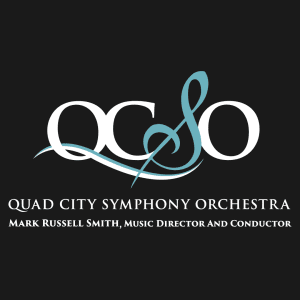
The Quad City Symphony starts its 107th season Oct. 2-3, at the Adler Theatre and Centennial Hall.
“Really cool things like that, that never would have happened before,” he said. The QCSO is relatively rare among U.S. orchestras in the past 18 months, in its frequency of performing continuously.
“Based on my knowledge of the orchestra industry, I would say across the country about a third of orchestras performed in some fashion,” executive director Brian Baxter said. “About two-thirds didn’t perform, as an orchestra. I think every orchestra had individuals doing things or small, small stuff like chamber music. But we were proudly in the category of groups that found ways to do things safely — obviously not to the fullness that we prefer.
“I would say compared across the country, it was unusual that we were able to do what we did,” he said. “It took a lot of hard work to pivot everything and get something out there that was safe and we could keep employing musicians and weather this storm.”
“It was a real challenge and we were pretty well-positioned to do something,” Baxter said. “I feel like small to midsize orchestras like us were best positioned. We’re more of a mid-sized orchestra, and were in the best position to do something. The big orchestras had challenges doing stuff and then the really small orchestras also did. So yeah, strange times.”
Given that major, top-tier orchestras like in New York, Boston and Chicago shelved all or most of their in-person concerts over the past 18 months, why did the QCSO persist in playing, even in an empty theater?
“It’s the whole organization, the board. Everybody had to be on board,” Smith said of their commitment to continue music. “From the get-go, the only thing we talked about was, how are we going to do it? Not, should we do it? How are we gonna make this happen – and that was
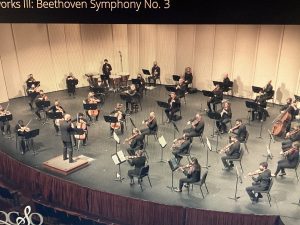
The QCSO featured reduced, socially distanced ensembles in the 2020-21 season.
from the board, the administration, and from the musicians. Any one of those entities could have put the kibosh on it, or been hesitant. Musicians absolutely were committed to doing it, and really, everybody.
“That was a real testament to, I think, the spunk and the spirit of the organization,” he said. “We didn’t hide ourselves; we didn’t run away from it. Of course it was difficult and there was a big learning curve. The first time you play and the trumpets are like 100 feet away from you…We got better, after the first concert, we figured out how to play socially distanced and how to solve these technical, logistical problems.”
For some, they substituted smaller Beethoven pieces in place of much bigger previously planned works, but they were still a satisfying challenge, Smith said. “It’s hard enough to play when you’re close together, much less spread out. They did a great job, and the spirit was always there. We had to rehearse for half an hour then take a break for the air to circulate. Everybody was just so cool about it; they were so happy to be there making music. We did it and nobody complained,” he marveled.
On Friday, Oct. 1, Baxter posted on Facebook about his enthusiasm for the new season:
“It feels SO good to get a call from our Music Director immediately after the first rehearsal of a concert program on which he simply wants to rave about how good our orchestra is and how great it is to make music with them from the downbeat of the first rehearsal. You. Must. Not. Miss. This. Show. This is a great one for FIRST TIME SYMPHONY GOERS, I promise you’ll be hooked. First time in 18 months our full orchestra has been all together on stage indoors is going to be magical.”
For tickets and more information on the new season, visit www.qcso.org.



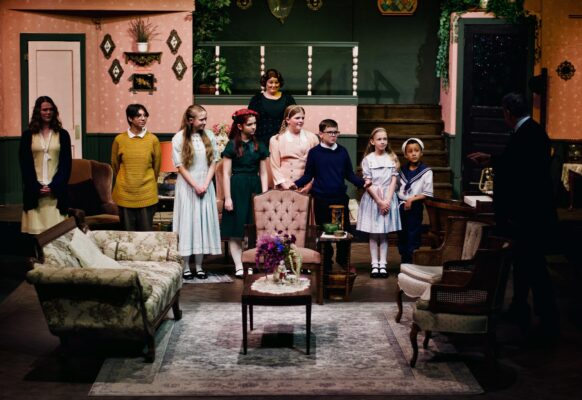
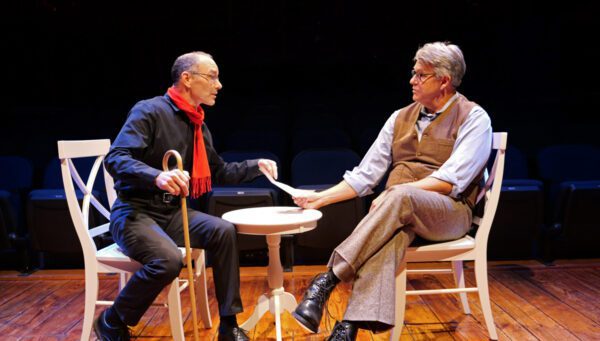
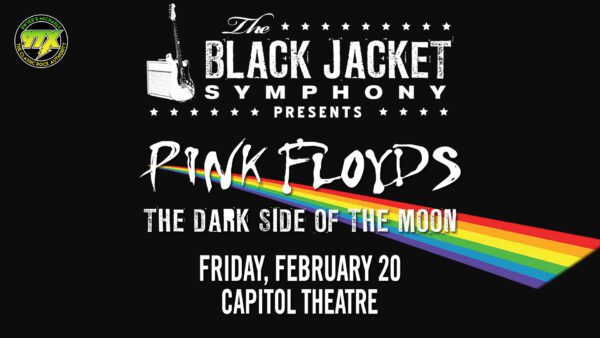







Leave a Reply
You must be logged in to post a comment.